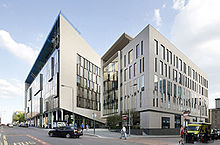Connected Places Catapult
This article needs additional citations for verification. (May 2020) |
The Connected Places Catapult is the British government innovation agency for the transport industry, and autonomous vehicles. It is one of several Catapult centres.
History

The organisation was formerly known as the Future Cities Catapult and also the Transport Systems Catapult, both being joined on 1 April 2019. It works with Innovate UK, in Swindon (Wiltshire). A Deep Academic Alliance agreement was signed with UK universities in July 2018.[1]
Future Cities Catapult
The Future Cities Catapult opened in London in 2013, to develop smart cities. Its first chairman was Sir David King, a professor of physical chemistry who was previously the government's Chief Scientific Adviser.[2]
Transport Systems Catapult
The Transport Systems Catapult opened in June 2014 in Milton Keynes, Buckinghamshire, directly west of Witan Gate House. The TSC worked with Wayra UK.
Structure

A site at the University of Leeds[3] (at a new innovation centre that opened in 2018) opened in May 2019. A site at the University of Strathclyde in Glasgow is at Innovo, next to the University of Strathclyde Technology and Innovation Centre, and west of the High Street railway station.
The London head office, which housed the Future Cities Catapult, is near the National Federation of Retail Newsagents and the Association of Optometrists.
Projects
The organisation researches intelligent transportation systems and automated driving systems.

References
- ^ University of Nottingham
- ^ "Multi-million pound future cities catapult to be hosted in London". GOV.UK. Retrieved 9 January 2020.
- ^ University of Leeds
External links
- 2019 establishments in the United Kingdom
- Automotive industry in the United Kingdom
- Catapult centres
- Clerkenwell
- College and university associations and consortia in the United Kingdom
- Government agencies established in 2019
- Organisations based in Milton Keynes
- Organisations based in the London Borough of Islington
- Science and technology in Buckinghamshire
- Science and technology in Glasgow
- Science and technology in West Yorkshire
- Transport in the London Borough of Islington
- Transport organisations based in the United Kingdom
- Transport research organizations
- University of Leeds
- University of Strathclyde
